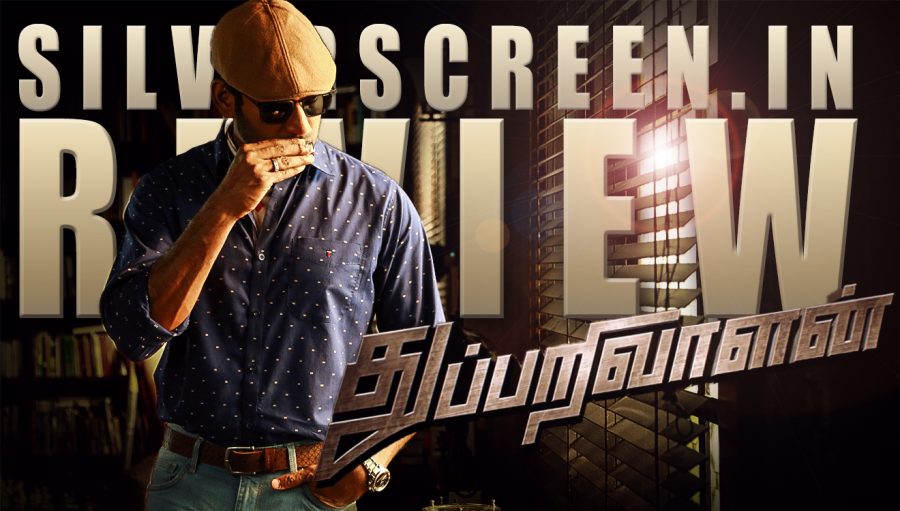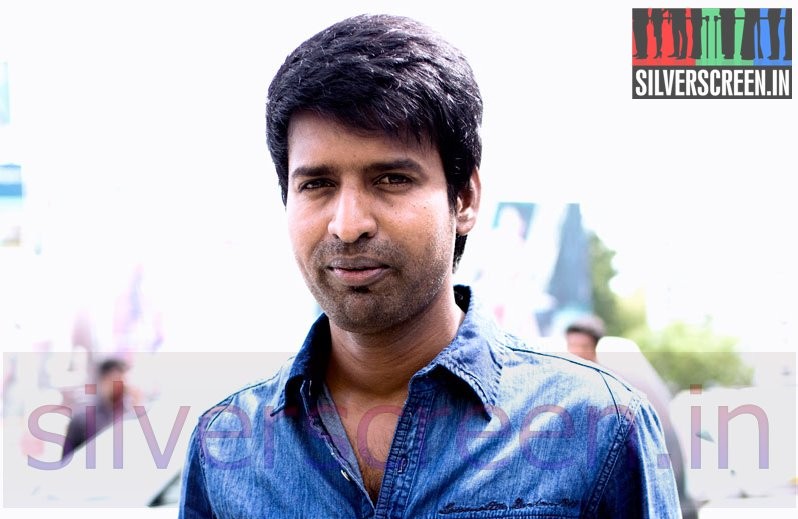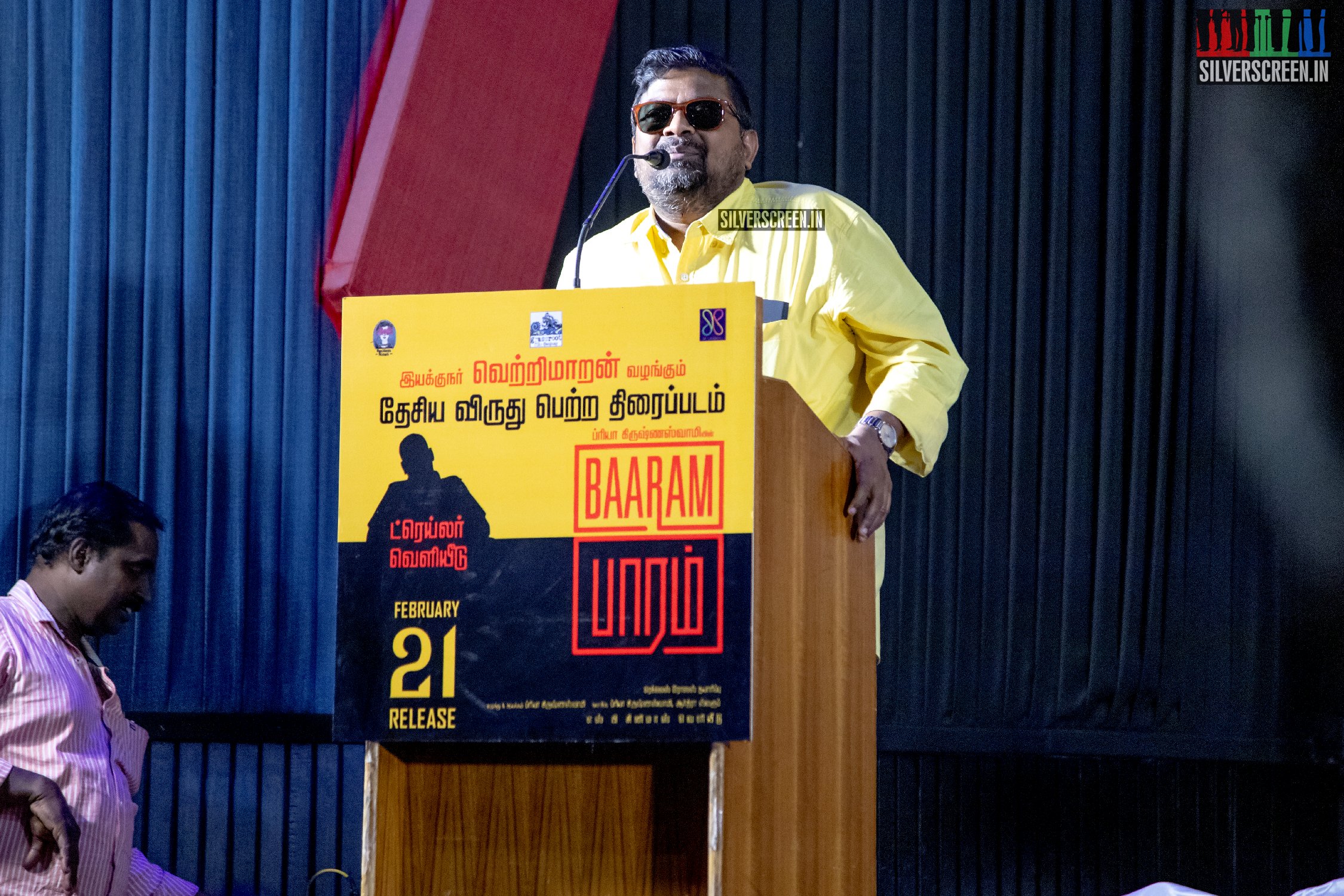In Mysskin’s Thupparivalan, the attributions are precise and gloriously pedantic. The kind that deserve an indulgent smile. A card announces dedications to Sir Arthur Conan Doyle and other Baker Street fans, just as the screen lights up to the face of a woman, awash in the soft glow of candles. She brings up a birthday cake for her husband in the terrace. A few moments later, a bolt of lightning strikes the terrace, and both her husband and son fall to the floor, charred stiff. The woman screams.
It’s a Mysskin film, one that seeks to scare; the obvious contempt and irreverence for mundane, feel-good beginnings is plain to see. Nor does Mysskin care about all the killing – even that of a child — in the first few moments; he establishes a swift, relatable connect – that of a young family engaged in quiet celebration in tellingly moody tones – and rips it apart just as quick. It’s fascinatingly morbid.
If a Mysskin-dressed Vishal is anything to go by, Sherlock Holmes, in his fitted clothing, and a stylish, slanted beret is quite a sight. His home-office is a tastefully-decorated sprawling apartment, with a handsome floor-to-ceiling bookshelf, filled with tomes of all shapes and sizes. Next to it, in precise detail, is a quaint library-ladder – one that comes with a platform. So thoughtful. Mysskin’s introduction to his Holmes though, is mildly unappealing. The camera acts as a body-double for Vishal, who runs amok around the apartment in a show of frustration. “Someone give me a case to solve!” he yells. Holmes in Thupparivalan, is portrayed as quite the eccentric, disagreeable man, who sits with a book upturned on his head – seriously meditating on a case, or getting antsy in the absence of one. Vishal broods on the couch, the library-ladder, book in hand, and when seized with a hunch, dashes across, Dr Watson (Prasanna as Prabhakaran ) in tow. The moments when Vishal does truly seem to channel Holmes’ spirit are when he’s still, his dark shades rendering an air of mystery, contemplating the finer points of a case. He also seems to possess Holmes’ innate ability to tell a person’s history from their appearance, but rarely does he explain how he arrived at the inference.
It doesn’t help that Mysskin’s Holmes is abusive, as well – and the director capitalises on what seems to be the current trend of employing brilliant-but-eccentric-and-arrogant male characters as leads, with curious bursts of morality. Kaniyan, who is well-muscled, and adept at flooring several Moriartys at once, rescues a woman from a pitiful existence; but when she seeks his help to earn a living, he unceremoniously pushes her inside the apartment, and hands her a mop. He yells, abuses, and is at his disrespectful best when addressing her, and yet strangely, she grows more adulatory of him, eventually becoming his romantic interest. A direct contrast to Holmes’ admiration and love for Irene Adler, the only woman, the only person to have ever outwitted him in the series, his arch-rival Moriarty notwithstanding.
*****
Several scenes in Thupparivalan are eerily reminiscent of Pisaasu. In a particular frame, Mysskin plays with positions, employing abrupt jump cuts for visual drama. Vishal, still brooding, appears and disappears at will within the frame. During an instance, he’s seen at the far end of screen, and in the next, he is ‘jumped’ up front.
Mysskin’s love for empty spaces is something that he channels in Thupparivalan as well, with shots that build suspense and skim intimately over surfaces – which even when irrelevant – make for good cinema. In a particular instance, the camera – positioned at a low angle – drifts slowly over the number plate of a car, which seems to be a subject of interest, until it comes to rest on someone crouching next to it.
The tale as such, is a web of intrigue which gets thicker and thicker until it becomes difficult to ascertain where it all ties together. When a little boy approaches Kaniyan Poonguntran to trace the person who murdered his dog, little does Kaniyan suspect that it would lead him on a completely different trail of interwoven conspiracies. Mysskin renders a distinctly pulpy flavour to the film by inventing a fantastical subplot, and trying to base it in ‘criminal science’ – something that Tamil writers had come up with decades ago. Indeed, in another show of attribution, Mysskin names his influences – in a wink at himself and the unassuming audience. He makes his characters introduce themselves as Stanley Kubrick, Shankarlal and Karl Marx, in well-spaced sequences.
Recommended
Mysskin also seems to live vicariously through Vishal; he makes him consult thick tomes from his towering bookshelf – which often appears in sharp relief, a character on its own – and, imbues him and others with traits characteristic of his films. In its final moments, as Holmes emerges victorious once again after a prolonged case of whodunit, Mysskin’s Moriarty – all unintended hilarity in what is propped up to be an emotionally-charged scene – apologises to the little boy for killing his dog. But then, he is not Moriarty; he’s ‘devil’, and his rival isn’t Holmes, but Kaniyan Poonguntran.
*****
The Thupparivalan review is a Silverscreen original article. It was not paid for or commissioned by anyone associated with the movie. Silverscreen.in and its writers do not have any commercial relationship with movies that are reviewed on the site.



